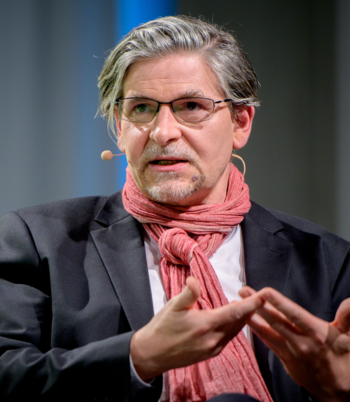Prof. Dr. Jan-Werner Müller

International Research College, Wissenschaftskolleg zu Berlin
Princeton University, Politics Department
Alumni, Joint Visiting Fellow from August 2020 to August 2021
Jan-Werner Müller is Professor at the Department of Politics at Princeton University (a SCRIPTS cooperation partner) and Founding Director of the History of Political Thought Project at the University Center for Human Values at Princeton University. He is interested in studying the structural transformation of existing intermediary institutions, in particular parties and the press, with regard to their distinctive contribution to liberal democracy from a normative perspective.
Research Interests
- Democratic Theory
- Constitutionalism
- European Union
- Politics and Religion
Current Research projects at SCRIPTS
Rethinking Contested Intermediary Institutions
Jan wishs to rethink intermediary powers, parties and professional media in particular, from a normative point of view. The diagnoses of crisis prominent today are often plausible at an empirical level: parties are running out of members; media are running out of money, etc. But they fail to explain both the distinctive contribution that intermediary powers make to liberal democracy, and they do not give us a sufficiently nuanced account of criteria to judge the political quality of specific intermediary institutions. The problematic result is twofold: on the one hand, it becomes difficult to make sense of the ongoing structural transformation of existing intermediary institutions (think, for instance, of the peculiar convergence between parties and media, which have started to recruit “members” just as if they were political or civil society organizations). On the other, we also find it harder to imagine functional equivalents of existing intermediary institutions, because we simply are not sure for what we are looking normatively.
Jan seeks to reconstruct some of the main aspects of the history of intermediary powers – partly so as to avoid what he sees as a common tendency to imagine a golden age for parties and the press (and sometimes also civil society more broadly). Clearly, there was no such golden age; for instance, one only needs to revisit some of Walter Lippmann’s writings from the 1920s to find concerns about the transformations of the press (he worried in particular about a “contagion of unreason”) that sound all too familiar today. Yet it would be equally fallacious to think that there are perennial problems affecting intermediary powers and that structural changes over time do not need to be understood properly. Furthermore, he seeks to identify the important normative aspects of intermediary institutions. Some of these are relatively well-known: there are rather obvious epistemic benefits, and there is the possibility of democratic mobilizations by what has been called non-elected representatives. But two points have received insufficient attention, Jan believes, and he would like to use his time as a fellow to explore these two hypotheses in particular:
First, properly functioning intermediary institutions generate a degree of pluralism. Parties are of course ideally committed to principles (as opposed to parties being just the instruments of machine politics); but principles neither explain nor execute themselves. There is always bound to be reasonable disagreement about what particular principles mean when it comes to prescribing concrete political conduct. Hence a well-functioning party will expose members, activists, and the public at large to what one might call principled pluralism – ideally, in such a way that it habituates citizens to pluralism without the latter becoming shorthand for relativism, or even political indifference. The same is true of well-functioning media: of course, there were always left-leaning and right-leaning newspapers, for instance (and, in the nineteenth-centiry US, papers were entirely partisan), but even they would have offered a degree of pluralism. Second, intermediary institutions structure political time and, sometimes, even purposefully stretch political time. Oscar Wilde famously complained that the problem with socialism was that it took too many evenings. The same has often been observed in more or less polite ways about cadre parties, mass parties, and maybe even catch-all parties, television parties, and digital parties. But the boredom of the drawn-out meeting hides a deeper normative (and also epistemic) surplus generated by the regularity implied by intra-party decision-making processes (including cooling-off periods). Temporal boundaries can enable the regularization of conflict (and, obviously, the period redistribution of political power); iterations at least sometimes might make compromises easier – hence the connection between structured time and pluralism.
See the publication list of Jan-Werner Müller at Princeton University here.
SCRIPTS Working Paper
Müller, Jan-Werner 2022: "Liberal Democracy’s Critical Infrastructure. How to think about Intermediary Powers". SCRIPTS Working Paper No. 16, Berlin: Cluster of Excellence 2055 “Contestations of the Liberal Script (SCRIPTS)”.
